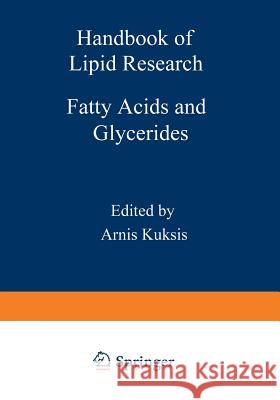Fatty Acids and Glycerides » książka
Fatty Acids and Glycerides
ISBN-13: 9781468425673 / Angielski / Miękka / 2012 / 469 str.
The advances in lipid biochemistry over the past 25 to 30 years have been dramatic and exciting. The elucidation of the pathways of fatty acid biosynthesis and oxidation, the delineation of the biogenesis of cholesterol from small-molecular- weight precursors, the structure proof of simple and complex lipids from plants, animals, and microorganisms, are excellent examples of the spectacular advances made during the golden era of lipid biochemistry. The multifaceted discoveries in these diverse areas of study could be attributed to development of highly sophisticated column chromatographic techniques for separation and purification of simple and complex lipids. The advent of thin-layer chromatography as well as gas- liquid chromatography provided an explosive impetus to research developments in this field. Concomitant advances in mass spectrometry allowed an interface with gas-liquid chromatography which spawned even greater insight into the structure of lipids. These eventful days of lipid chemistry nearly 25 years ago led to a relatively quiescent period wherein scientists applied these newly available techniques to investigation of the behavior of isolated (lipid) enzyme systems and to unraveling the intricacies of the metabolic behavior of lipids in the intact cell or whole organisms. Then, in the early 1960s, a decided change in research emphasis developed with the advent of a simple, reproducible procedure for the isolation of cell membranes.











